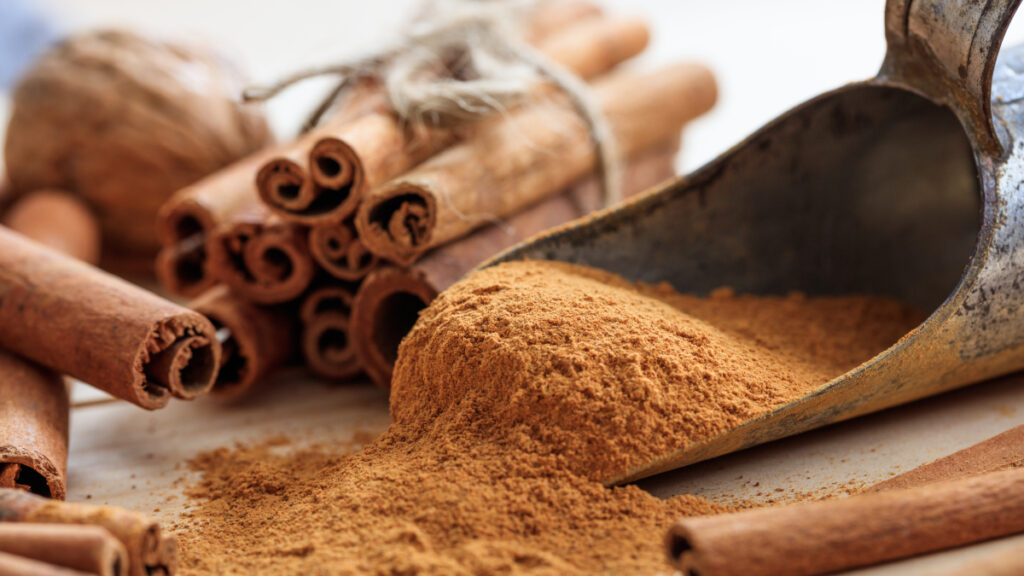Who doesn’t know about cinnamon? Almost nobody. But how many people know its health benefits, nutrition facts, uses, and side effects? Only a few. Yet, cinnamon is one of the most common items in every kitchen.
Cinnamon is a spice produced from the inner bark of cinnamon trees, used mainly as an aromatic ingredient and to enhance flavour in many foods. Removal of cinnamon bark from the tree involves a lot of extraction processes, after which it is primarily left in the sun to dry.
When the cinnamon bark is thoroughly dried into strips, they are further heated to form rolls, known as cinnamon sticks, sold in the market. The cinnamon sticks are then grounded to powder as an aromatic ingredient in different cuisines.
The spice is one of the world’s oldest spices with many benefits. Some of the health benefits of cinnamon are to treat erectile dysfunction in males, improve good cholesterol (HDL) in the body, combat cancer-causing radicals from the body and so on.
Even though cinnamon (and most spices in general) often provide some health benefits, it also has potential side effects. This is because cinnamon can be ingested in four ways – sprinkled on food, used in tea or coffee, taken as capsules, and swallowed with honey.
Cinnamon capsules, commonly known as cinnamon supplements, need to be taken in moderation because coumarin, a common constituent in Cassia cinnamon – a common type sold in stores – may cause side effects.
Considering the deep history of cinnamon, it may seem as if you’ve already known everything there is to know about this common and aromatic ingredient. But you need to think again by finding out if you’re getting the most out of it and learn when its use can set you at risk.
Let’s take a closer look at what is to be known about this potent, common, and aromatic spice.
Health benefits
Vitamins, minerals, magnesium, potassium, calcium and other plant compounds in cinnamon provide essential health benefits of this aromatic spice. Potassium helps relieve blood pressure and regulate heart rate by counteracting sodium’s effects. It is also involved in nerve function.
In addition to that, other health benefits of this aromatic spice are (but are not limited to);
a. Infertility treatment
The spice is a natural aphrodisiac found to increase the sexual drive, which can advertently treat infertility. Cinnamon’s role in infertility treatment is to improve sexual desire in men, thereby increasing sperm production.
b. Reduce the risk of cancer
This aromatic spice is found to reduce the growth of cancer-causing cells. Cinnamon can also reduce detoxifying elements from the colon, lowering the chances of colon cancer.
Nutrition facts
You may have yet to think about cinnamon’s nutritional content, but it contains almost no protein or fat, which doesn’t play a significant role in overall nutrition. Be that as it may, a teaspoon of grounded cinnamon sticks does include the following;
- About 6 calories
- About 0.1 gram of protein
- About 0.03 grams of fat
- About 2 grams of carbohydrates
- About 1 gram of fibre
- About 26 milligrams of calcium
- About 11 milligrams of potassium
- About 3 mcg (micrograms) of beta carotene
- About 8 I.U. (International Units) of vitamin A
Uses
1. Cinnamon sticks, obtained from dried cinnamon barks, are great for steeping into a cup of tea, hot cider, or coffee. The true cinnamon variety is the Ceylon cinnamon (or sticks), but the common one sold in the market is the cassia cinnamon.
2. Powdered cinnamon is common in almost everybody’s kitchen and is used for preparing different dishes.
3. Essential oils of this aromatic spice, made from the bark, root bark, and leaves of the cinnamon tree, are used for flavour, fragrance, and medicinal properties. From cinnamon bark oil, the main chemical compound that gives cinnamon its taste is cinnamaldehyde. Eugenol is found in high concentrations in leaf oil, sometimes used as an antiseptic. In the root bark oil, camphor concentrations are high.
4. Cinnamon capsules (and pills) are mainly made from cassia cinnamon as supplements. They are, however, safe for short-term use. But before you start taking cinnamon supplements, speak to a doctor first, as too much use of it can be harmful.
Side effects
Cinnamon consumption hasn’t been attributed to any cases of side effects, but because cassia cinnamon contains coumarin, it can damage the liver when consumed in excess. To be safe, ensure you purchase and consume Ceylon cinnamon; it is the healthiest cinnamon because it is the “true cinnamon”.
It is safe in moderation for those taking cinnamon capsules (or pills) as supplements. However, some people may be allergic to consuming large quantities or for extended periods. Therefore, you should have it as a food ingredient in reasonable quantity to enhance the taste of your prepared food while reaping its positive health benefits.
Speak to a doctor before taking cinnamon supplements. If you have other health concerns that need the hearing of a doctor, get started HERE.

